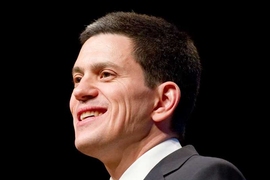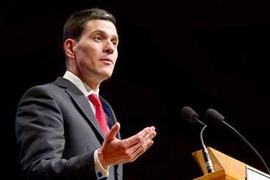The MIT School of Humanities, Arts, and Social Sciences (SHASS) has announced that the Right Honorable David W. Miliband SM ’90, president and CEO of the International Rescue Committee (IRC), has been recognized with the 2021 Robert A. Muh Alumni Award.
The biennial Muh Alumni Award recognizes the tremendous achievements of MIT degree holders who are leaders in one of the Institute’s humanities, arts, or social science fields. The prize was founded in 2000 by Robert Muh ’59 and his wife Berit, on the occasion of the school’s 50th anniversary. This year’s award recognizes Miliband’s long and distinguished political career in the United Kingdom and his leadership in addressing the global refugee crisis. Miliband earned an SM in political science at MIT in 1990 as a Kennedy Scholar following his studies in philosophy, politics, and economics at Oxford University.
“One of the ablest, most creative public servants of our time”
“First through his many roles in the British government and now as the leader of the International Rescue Committee, David Miliband’s life of dedicated service epitomizes the analytical and humanistic perspectives fostered in MIT’s rigorous social science fields,” says Melissa Nobles, Kenan Sahin Dean, MIT School of Humanities, Arts, and Social Sciences. “We are proud to count him among our distinguished alumni, and this honor pays tribute to all that he has accomplished to-date in his impressive career.”
From 2007 to 2010, Miliband served as the youngest foreign secretary in three decades, driving advancements in human rights and representing the United Kingdom throughout the world. His accomplishments have earned him the reputation as "one of the ablest, most creative public servants of our time,” as former U.S. President Bill Clinton said. In 2016, Miliband was named one of the World’s Greatest Leaders by Fortune magazine, and in 2018 he was inducted into the American Academy of Arts and Sciences.
In 2013, Miliband was named president and CEO of the International Rescue Committee, where he oversees the organization’s relief and development operations in over 40 countries. The IRC was founded at the suggestion of Albert Einstein in 1933 after his own escape to the United States, saying, “I am almost ashamed to be living in such peace while the rest struggle and suffer.” The IRC responds to the world’s worst humanitarian crises and helps people whose lives and livelihoods are shattered by conflict and disaster to survive, recover, and regain control of their future in more than 40 countries around the world and 20 cities across the United States.
Miliband is also the author of "Rescue: Refugees and the Political Crisis of Our Time" (Simon & Schuster, TED Books, 2017). As the son of refugees, Miliband brings a personal commitment to the IRC's work and to the premise of his book: that we can rescue the dignity and hopes of refugees and displaced people, and that in the process we will rescue our own values. Refugee Research Online writes that the book reflects the best of Einstein’s founding principles in first imagining the IRC.
Rebuilding accountability
Miliband will deliver the Muh Award Lecture on Wednesday, April 28 at noon EDT, free and open to the public via MIT webcast. The talk, entitled “The Age of Impunity: How Countervailing Powers Can Rebuild Accountability,” will encompass a new framework for exploring the shift in geopolitics focused on impunity, a lack of consequences for egregious violations of law and norm, and the erosion of accountability.
In response to the ebbing of international laws and norms that restrain states from abusing their power and the humanitarian crises bred of that abuse, Miliband plans to propose a potential solution: the idea that every power — political, economic, social; individual, collective, corporate — needs to be held in check by countervailing power to prevent the tendency to impunity. This concept of countervailing powers provides the basis for an "accountability agenda" that has the potential to restore and promote respect for human rights, democratic norms, and the rights of civilians in combat zones.









